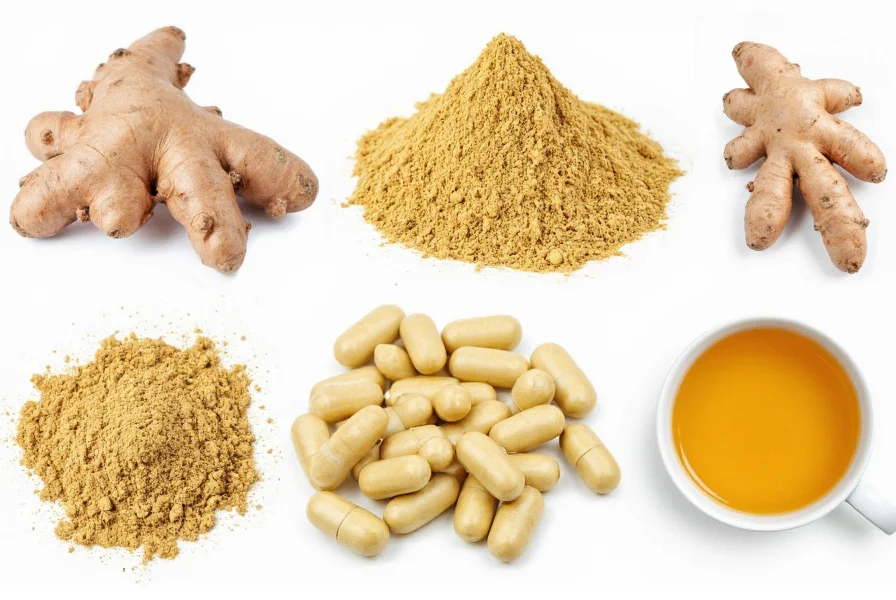Ginger (Zingiber officinale) has been used medicinally for over 2,000 years across Asian and Middle Eastern cultures. Modern research confirms many traditional uses while revealing new applications for this versatile root. The rhizome contains more than 400 bioactive compounds, with gingerols being the most pharmacologically significant.
How Ginger Works: The Science Behind Its Effects
Ginger's therapeutic properties stem primarily from gingerols and their derivatives. These compounds interact with multiple physiological systems:
| Active Compound | Concentration in Fresh Ginger | Primary Biological Actions |
|---|---|---|
| 6-Gingerol | 0.5-1.5% | Anti-inflammatory, antioxidant, antiemetic |
| 6-Shogaol | 0.1-0.3% (higher in dried) | Pain relief, neuroprotective effects |
| Zingerone | Trace amounts | Antioxidant, antimicrobial |
These compounds work through several mechanisms including inhibition of prostaglandin and leukotriene synthesis, suppression of inflammatory cytokines, and modulation of serotonin receptors in the gastrointestinal tract.
Evidence-Based Health Benefits of Ginger
Nausea and Vomiting Relief
Multiple clinical trials confirm ginger's effectiveness for various types of nausea. A comprehensive 2022 meta-analysis published in Nutrients reviewed 20 studies involving over 2,000 participants. The analysis found ginger significantly reduced:
- Morning sickness in pregnancy (1.0-1.5g daily)
- Postoperative nausea (1g before surgery)
- Chemotherapy-induced nausea (0.5-1g daily)
- Motion sickness symptoms
Researchers attribute these effects to ginger's ability to block serotonin receptors in the gut and affect gastric motility. For those wondering what does ginger do for nausea, the evidence shows it works faster than many conventional antiemetics with fewer side effects.
Anti-Inflammatory and Pain-Relieving Properties
Ginger demonstrates significant anti-inflammatory effects comparable to some non-steroidal anti-inflammatory drugs (NSAIDs), but without the gastrointestinal side effects. A 2021 randomized controlled trial in Arthritis Care & Research found that 2g of ginger daily reduced osteoarthritis pain by 30% after 12 weeks.
The mechanism involves inhibition of COX-2 enzymes and reduction of inflammatory markers like TNF-α and IL-6. When considering how does ginger reduce inflammation, researchers note it affects multiple inflammatory pathways simultaneously, making it particularly effective for chronic inflammatory conditions.

Digestive Health Enhancement
Ginger stimulates digestive enzymes and accelerates gastric emptying. A study in World Journal of Gastroenterology demonstrated that 1.2g of ginger powder taken before meals increased gastric emptying rate by 25% in healthy adults.
This explains why traditional medicine systems have long used ginger for:
- Relieving indigestion and bloating
- Reducing symptoms of functional dyspepsia
- Alleviating irritable bowel syndrome (IBS) discomfort
- Preventing gastrointestinal spasms
For individuals researching does ginger help with digestion, the scientific consensus confirms ginger's prokinetic effects make it valuable for multiple digestive concerns.
Additional Evidence-Supported Benefits
Antioxidant Protection
Ginger contains potent antioxidants that combat oxidative stress. Research shows ginger supplementation increases levels of glutathione and superoxide dismutase, key endogenous antioxidants. This contributes to ginger's protective effects against cellular damage.
Cardiovascular Support
Studies indicate ginger may help maintain healthy blood pressure and cholesterol levels. A 2023 review in Phytotherapy Research found ginger supplementation reduced LDL cholesterol by 12% and triglycerides by 15% in clinical trials.
Immune System Modulation
While not a direct immune booster, ginger's anti-inflammatory and antioxidant properties support overall immune function. Research suggests ginger may enhance the body's defense against respiratory infections through multiple pathways.

Optimal Forms and Dosages
The effectiveness of ginger depends on both the form and dosage:
- Fresh ginger: Contains highest gingerol content; 1-2 inches daily provides therapeutic benefits
- Dried powder: More concentrated; effective dose 1-2g daily
- Extracts: Standardized to gingerol content; typically 250-500mg 2-3 times daily
- Ginger tea: Requires 2-4g of fresh or dried root per cup for therapeutic effects
For specific conditions:
- Nausea: 250-1000mg every 4 hours as needed
- Inflammation: 1500-2000mg daily in divided doses
- Digestive support: 2g before meals
Safety and Considerations
Ginger is generally safe for most adults at recommended doses. Potential side effects include mild heartburn or mouth irritation. Those taking blood thinners should consult a healthcare provider before using therapeutic doses, as ginger may enhance anticoagulant effects.
Pregnant women can safely use ginger for morning sickness (up to 1g daily), but should avoid excessive consumption during the third trimester. Individuals with gallstones should consult a physician before regular ginger use.
Incorporating Ginger Into Your Routine
For those exploring what are the health benefits of ginger root in practical terms, consider these evidence-based approaches:
- Add freshly grated ginger to smoothies or juices
- Prepare ginger tea by steeping 1-2 inches of sliced ginger in hot water for 10 minutes
- Include ginger in stir-fries and curries
- Take standardized ginger supplements for specific therapeutic purposes
- Use ginger in baking for anti-inflammatory benefits
Consistency matters more than single large doses. Daily consumption of moderate amounts provides cumulative benefits for most health concerns.
Conclusion
Ginger's multifaceted biological actions make it one of the most versatile natural remedies supported by modern science. From its antiemetic properties to its anti-inflammatory effects, the evidence for what does ginger do continues to grow. While not a cure-all, incorporating ginger into your diet or supplement regimen can provide meaningful support for digestive health, inflammation management, and overall wellness when used appropriately.
Frequently Asked Questions
How quickly does ginger work for nausea?
Ginger typically begins working within 20-30 minutes when taken for nausea. For best results, consume 250-500mg of ginger powder or 1-2 teaspoons of fresh grated ginger at the first sign of nausea. Studies show maximum effects occur within 1-2 hours, with benefits lasting 4-6 hours depending on the dose and form used.
Can ginger reduce muscle pain after exercise?
Yes, research indicates ginger can reduce exercise-induced muscle pain. A study in the Journal of Pain found that 2g of ginger daily for 5 days reduced muscle pain by 25% following intense exercise. The anti-inflammatory compounds in ginger help decrease inflammation in muscle tissue, with effects becoming noticeable after 24-48 hours of consistent use.
Does ginger interact with medications?
Ginger may interact with blood-thinning medications like warfarin, potentially increasing bleeding risk. It might also enhance the effects of diabetes medications, leading to hypoglycemia. Those taking hypertension medications should monitor blood pressure, as ginger may enhance blood pressure-lowering effects. Always consult your healthcare provider before combining ginger supplements with prescription medications.
What's the difference between fresh and dried ginger?
Fresh ginger contains higher levels of gingerols, while dried ginger has more shogaols due to the conversion during drying. Shogaols are more potent but less stable. Fresh ginger is better for nausea relief, while dried ginger may provide stronger anti-inflammatory effects. One inch of fresh ginger equals approximately 1/4 teaspoon of dried ginger powder in terms of active compounds.
Can ginger help with weight management?
Some research suggests ginger may support weight management through multiple mechanisms: increasing thermogenesis, improving lipid metabolism, and reducing inflammation associated with obesity. A 2020 review in Complementary Therapies in Medicine found ginger supplementation led to modest reductions in body weight and waist-to-hip ratio, though more research is needed to determine optimal dosing for this purpose.











 浙公网安备
33010002000092号
浙公网安备
33010002000092号 浙B2-20120091-4
浙B2-20120091-4